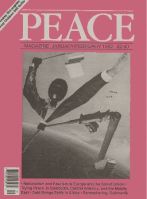
Peace Magazine Jan-Feb 1992, page 31. Some rights reserved.
Search for other articles by PMag staff here
By Shirley Farlinger
The United Nations is investigating the presence of nuclear, chemical, and biological weapons production facilities in Iraq. Their analysis is not yet complete but Ambassador Ekeus, Executive Chairman of the Special commission says, "It appears that Iraq was something between 12 and 18 months away from a bomb. ..on biological weapons we have not found any production but are continuing our search." All the enriched uranium found in Iraq was supplied by France and the USSR. Stocks of chemical weapons have also been found and some are leaking, according to a preliminary report. Ekeus sees some good coming from this:
"Arms control is possible, in the face of a systematic violator ... Chapter VII dealing with the enforcement measures of the Charter shows that it is possible to achieve disarmament."
Just as alarming is news from a secret report of the United Kingdom Atomic Energy Authority printed on Nov. 10 in The Independent. The Gulf Coalition Forces left at least 40 tons of depleted uranium on the battlefield. The health of Kuwaitis and clean-up teams is threatened and the toxic radioactivity could pass into the food chain and water supply.
The report said "the DU (depleted uranium) will be spread around the battlefield and target vehicles in varying sizes and quantities from dust particles to full size penetrators and shot. It would be unwise for people to stay close to large quantities of DU for long periods and this would obviously be of concern to the local population if they collect this heavy metal and keep it. There will be specific areas in which many rounds will have been fired where localized contamination of vehicles and the soil may exceed permissible limits and these could be hazardous to both clean-up teams and the local population.
The problem will not go away and should be tackled before it becomes a political problem created by the environmental lobby. It is in both the Kuwait and the U.K interest that this is not left to rear its head in the years to come."
The uranium was in tens of thousands of armor-piercing rounds fired at Iraqi vehicles from American aircraft and British and U.S. tanks during the conflict. The AEA says that the immediate danger comes from uranium dust produced when depleted uranium shells hit and burned out Iraqi armored vehicles and airborne particles may have been inhaled.
The U.K. government does not acknowledge the report and Kuwait probably has not been informed.
By Shirley Farlinger
Walter Dorn of Science for Peace is putting together a proposal which will go to the Secretary General for an early warning system which would supply the head of the U.N. with the latest information on potential conflict areas around the world. He feels this is essential, especially as the Secretary-General is being asked more frequently to use his good offices to intervene in situations such as the Persian Gulf.
By Shirley Farlinger
United Nations Radio is available to all radio stations. CIRT, 91.1 FM in Toronto carries U.N. Report daily at 5:30 p.m. as part of its international affairs program. Ask your local radio station to contact U.N. Radio, Rm. 850, United Nations, N.Y., N.Y. 10017 for more information.
At the first World Women's' Congress for a Healthy Planet in Miami in November, militarism was condemned as a leading contributor to the world's environmental crisis. According to Michele Landsberg in the Toronto Star of November 15,1999,
"Peggy Antrobus, director of Women and development at the University of the West Indies in Barbados, angrily told the audience to 'make the links between decisions reached in far-off boardrooms and military headquarters, and the world wide subordination of both women and nature."'
Dorothy Rosenberg, who attended the summit and is involved in plans for further women's participation in the UNCED Earth Summit, will write in more detail about the conference and follow-up for the next issue.
By Janet Creery
Boutros Ghali, Egypt's 69 year old deputy prime minister, has been selected as the new Secretary General. The African bloc is presumably appeased, although many have expressed disappointment that a Northern rather than a Sub-Saharan African was chosen. For many Ghali seems only nominally African, being an Arab and a Coptic Christian.
Ghali is the son of a wealthy family, an expert in international law, and -crucial for the bilingual U.N.- a fluent speaker of both French and English. He was a negotiator at Camp David and he has been a mediator in many African conflicts. His new job will pay him a little over U.S. $200,000 a year.
Source: Time Magazine

Peace Magazine Jan-Feb 1992, page 31. Some rights reserved.
Search for other articles by PMag staff here